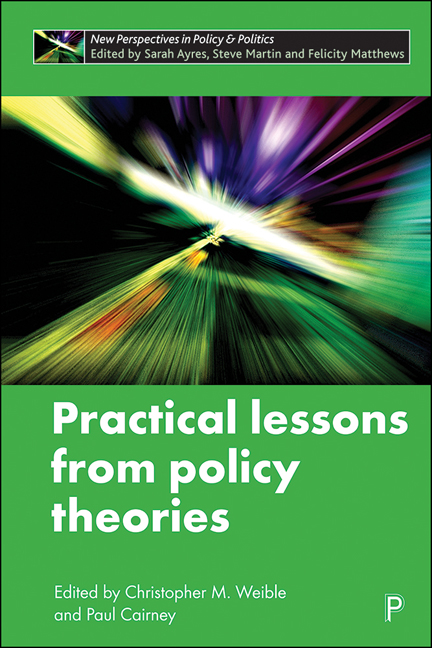Book contents
- Frontmatter
- Contents
- List of figures and tables
- Notes on contributors
- one Purposes and paths in drawing practical lessons from policy theories
- two Three habits of successful policy entrepreneurs
- three Narratives as tools for influencing policy change
- four Using cultural theory to navigate the policy process
- five The lessons of policy learning: types, triggers, hindrances and pathologies
- six Practical prescriptions for governing fragmented governments
- seven Drawing practical lessons from punctuated equilibrium theory
- eight Policy design and the added-value of the institutional analysis development framework
- nine Why advocacy coalitions matter and practical insights about them
- ten Reflections and resolutions in drawing practical lessons from policy theories
- Index
five - The lessons of policy learning: types, triggers, hindrances and pathologies
Published online by Cambridge University Press: 05 January 2022
- Frontmatter
- Contents
- List of figures and tables
- Notes on contributors
- one Purposes and paths in drawing practical lessons from policy theories
- two Three habits of successful policy entrepreneurs
- three Narratives as tools for influencing policy change
- four Using cultural theory to navigate the policy process
- five The lessons of policy learning: types, triggers, hindrances and pathologies
- six Practical prescriptions for governing fragmented governments
- seven Drawing practical lessons from punctuated equilibrium theory
- eight Policy design and the added-value of the institutional analysis development framework
- nine Why advocacy coalitions matter and practical insights about them
- ten Reflections and resolutions in drawing practical lessons from policy theories
- Index
Summary
Introduction
The literature on policy learning has generated a huge amount of heat (and some light) producing policy learning taxonomies, concepts and methods, yet the efforts to demonstrate why we should think about policy processes in terms of learning have been rare and mostly in the past (Dunlop, Radaelli and Trein, 2018). Additionally, policy learning has progressed in different sub-fields, such as the study of diffusion, transfer, individual and collective learning, social learning, and knowledge utilisation (see the family tree of learning in Dunlop, Radaelli and Trein, 2018; and the fragmentation in sub-fields portrayed in Goyal and Howlett, 2018). This has discouraged the tasks of communicating, comparing and combining insights that, the editors of this special issue remind us, are fundamental to translate research to a wider audience, avoiding jargon and obfuscation.
We offer this chapter to both an audience of academics and to actors involved in policy-processes, be they elected politicians, public managers, activists or pressure groups. We address the academic audience made up of specialists in policy analysis by arguing that the quality of our findings should be judged in terms of ‘translation reach’. We set out to show how we can combine and integrate research on learning so that it can be translated to a wider audience of social scientists looking for cumulative findings, typical lessons, concepts that travel across fields.
The concept of ‘wider audience’ means, however, that a useful assemblage, synthesis and communication of findings should also assist social scientists in carrying a conversation with those who are directly involved or affected by policy processes. Our central proposition is that these two readerships (social scientists and practitioners) can be combined if we fine-tune our effort to maximise the reach of translation around exemplary lessons. Thus, we answer the following questions: what are the lessons of thinking about policy processes in terms of learning? What are their triggers and hindrances? What can go wrong with learning, that is, what are the pathologies? Answering these particular questions shows to social scientists the value and explanatory leverage of drawing on learning theory to analyse public policy. But it also points practitioners towards usable knowledge: lessons that can be applied to real-world policy processes. This particular focus brings us close to another important goal of the special issue: to bridge the theory– practice divide.
- Type
- Chapter
- Information
- Practical Lessons from Policy Theories , pp. 83 - 104Publisher: Bristol University PressPrint publication year: 2021



